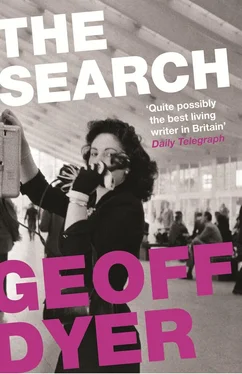Geoff Dyer - The Search
Здесь есть возможность читать онлайн «Geoff Dyer - The Search» весь текст электронной книги совершенно бесплатно (целиком полную версию без сокращений). В некоторых случаях можно слушать аудио, скачать через торрент в формате fb2 и присутствует краткое содержание. Год выпуска: 2013, Издательство: Canongate Books, Жанр: Современная проза, на английском языке. Описание произведения, (предисловие) а так же отзывы посетителей доступны на портале библиотеки ЛибКат.
- Название:The Search
- Автор:
- Издательство:Canongate Books
- Жанр:
- Год:2013
- ISBN:нет данных
- Рейтинг книги:3 / 5. Голосов: 1
-
Избранное:Добавить в избранное
- Отзывы:
-
Ваша оценка:
- 60
- 1
- 2
- 3
- 4
- 5
The Search: краткое содержание, описание и аннотация
Предлагаем к чтению аннотацию, описание, краткое содержание или предисловие (зависит от того, что написал сам автор книги «The Search»). Если вы не нашли необходимую информацию о книге — напишите в комментариях, мы постараемся отыскать её.
The Search — читать онлайн бесплатно полную книгу (весь текст) целиком
Ниже представлен текст книги, разбитый по страницам. Система сохранения места последней прочитанной страницы, позволяет с удобством читать онлайн бесплатно книгу «The Search», без необходимости каждый раз заново искать на чём Вы остановились. Поставьте закладку, и сможете в любой момент перейти на страницу, на которой закончили чтение.
Интервал:
Закладка:
As he made his way towards the platform he passed a Photo-Me booth and ducked beneath the curtain. It was as good a place as any to hide from view but, without intending to, he found himself spinning the stool down as far as it would go and paying in coins, posing for four sudden snaps of the flash. Clambering out of the booth he saw a woman reading a tabloid stroll towards him. An Asian girl went into the booth. He looked at the clock and at the sign that said ‘Photos Delivered in Four Minutes’. All around this sign were sample photos of smiling couples, smiling and serious individuals. One strip showed a black and white couple kissing and pulling faces — you could do what you wanted in the relative privacy of the booth; the machine didn’t care, it recorded but didn’t notice. Ugly or beautiful, tall or short, everyone came out the same way.
After only a couple of minutes the pictures arrived. He moved towards the machine but saw they were of a woman, the woman reading the paper, who reached down and took them.
The developing times were cumulative, so he had another four minutes to wait — more like five probably — and it was now exactly four minutes to. The train’s departure was being announced. Two minutes clicked by. He looked up at the clock, glanced down at the little metallic cage where the photos arrived and set off for the train. He had gone two steps when he thought he heard a faint rustle from the booth. He hurried back, checked the empty tray and ran for his train.
CHAPTER SEVEN
Buildings, people, streets and shops: beyond that Alemain had little to recommend it — especially since Walker had such trouble finding his way around.
He had picked up a street plan at the station and set off for the Am Ex office. For an hour now he had been pacing the streets, scrutinizing the map at almost every corner, but was still nowhere near his destination. The smaller streets were not shown on the map but it was detailed enough to reveal that he was lost. This was the true purpose of maps: without one it was impossible to say with certainty that you were lost, with one you knew you were lost.
Walker persisted for a long while, becoming steadily more frustrated as streets changed name, distances expanded or contracted and expected turnings and landmarks failed to appear. Gradually he became convinced that the map bore no relation to his surroundings. The fact that here and there reality and representation corresponded was entirely coincidental. It took Walker a long time to accept this: so entrenched was his faith in the integrity of maps that his first reaction was to assume that the map was right and the city somehow wrong. The whole point about a map was that it was a more or less accurate representation of reality. He had heard of towns where streets and buildings were being demolished and built so fast that maps, lagging behind reality, were obsolete by the time they were printed, but this map either deliberately distorted reality or ignored it.
He threw the map away and walked on. Once he had got used to the idea that the town was not as the map had led him to expect, it was surprisingly easy to find his way around.
At the Am Ex office a pretty Chinese woman trotted off to look for his mail. A minute later she came back with the letter he had sent from Usfret. He thanked her and headed back to the station, caught the next train to Avlona.
He had noticed bicycles being wheeled on to the train at stations en route , but when it pulled into Avlona he was surprised at how many people had bicycles. As he walked towards the centre of town, cyclists were coming and going in all directions. All around was the angular flash and blur of spokes and frames.
It was a warm spring afternoon and Walker dawdled on his way to the Am Ex office. Relieved to be somewhere pleasant after Usfret and Ascension, he decided to spend the rest of the day there, even though the letter from Usfret was waiting for him. He walked back out into the last sunshine of the day. Leaves fluttered like bunting.
Outside a bric-a-brac store he spun a squeaking rack of postcards. An old photograph of London caught his attention. It was taken in the nineteenth century when London was a teeming and bustling centre of commerce and trade — but the city was deserted. Walker puzzled over the image for several minutes before realizing that the long exposure time had emptied the scene of all moving objects: people, trams, horses.
He walked and considered what to do next, where to go. Again, when he looked back, this moment would represent another important shift in the nature of his search for Malory. For the first time he had formulated the question in terms of where he should go rather than where Malory had gone. It was not that the question of Malory’s whereabouts no longer mattered — but that question had been absorbed so totally into his own decision-making process that he no longer needed to ask it. It was as if the only way of duplicating Malory’s movements was to anticipate them. Inevitably he would make mistakes but these mistakes might lead him to the right track eventually. The right path might be, precisely, a culmination of mistakes, of detours. As soon as you recreated it on a map or set it down in a book, even the most idiosyncratic random movements acquired an internal logic; their purpose remained elusive but they formed a path, a route, led somewhere. With such a map he could find his way back.
In the morning he walked past a shop with a row of used bicycles chained up outside. The shop was run by an old man who claimed to have ridden in the Tour. Walker indicated a bike he liked and the old man unlocked the chain and extricated it from the row: ten-speed, dropped handlebars, light enough to be picked up easily with one hand. Walker rode it around the block and asked the old man what he wanted for it.
‘You’ve read those stories about a knight on his charger?’
‘Yes.’
‘You seen Westerns? The cowboy on his horse?’
Walker nodded.
‘Now it’s you on that bike. A clear line of descent. Seventy-five buys you the bike and the ancestors.’
‘What about just the bike?’ said Walker, but as far as the old man was concerned the deal was clinched already.
Walker paid up, lashed his bag to the rack and pedalled off.
‘So long, cowboy,’ called the man who had once ridden in the Tour, stuffing Walker’s money into his pocket.
The morning’s chill still clung to the air but after riding for fifteen minutes he felt fine. He headed out of town, the volume of cyclists diminishing steadily as he went. The road was flat and ran alongside a river with fields stretching away on the other side.
For lunch he bought bread, fruit and water and sat down to eat behind the goalpost of a deserted football pitch. A breeze rustled the bushes beyond the touchlines. The goal was smudged with dried mud where the ball had ricocheted off crossbar and posts. The goalmouth and centre circle were dry and bare, pock-marked by studs. Chewing and swallowing, he imagined some archaeologist of the future re-creating sequences of play and estimating the scores of games played here from the patterns of stud-marks on the pitch.
In the middle of the afternoon he came to a bridge, rising high and golden in the blue sky. As he drew closer he saw that what he had taken to be the ripple of hot air was actually the bridge itself rippling in the air. It undulated gently as if a wave were passing through it, as if its burnished girders were made not of steel but of some highly elastic material.
He stopped at the edge of the bridge, watching it rise and fall rhythmically, breathing. There was no traffic. A sign said BRIDGE CLOSED and a barrier blocked the carriageway. He manoeuvred his bike round the barrier and walked out on to the bridge. At first, although he could see the bridge undulating ahead of him, the cables growing taut and slack with strain, he hardly felt any movement. Then, as he moved out over the river, he felt the road shifting beneath his feet like a ship on calm seas. There was no sense of danger. He looked at the bridge’s flowing reflection in the river below. He dropped a stone over the edge and watched it fall and splash, vanish. Out of the corner of his eye he saw a bird swoop down and glide low over the river. After a few minutes he got on his bike and cycled over the shifting hills and dips. The sun strobed through the stanchions and cables rearing above him.
Читать дальшеИнтервал:
Закладка:
Похожие книги на «The Search»
Представляем Вашему вниманию похожие книги на «The Search» списком для выбора. Мы отобрали схожую по названию и смыслу литературу в надежде предоставить читателям больше вариантов отыскать новые, интересные, ещё непрочитанные произведения.
Обсуждение, отзывы о книге «The Search» и просто собственные мнения читателей. Оставьте ваши комментарии, напишите, что Вы думаете о произведении, его смысле или главных героях. Укажите что конкретно понравилось, а что нет, и почему Вы так считаете.












